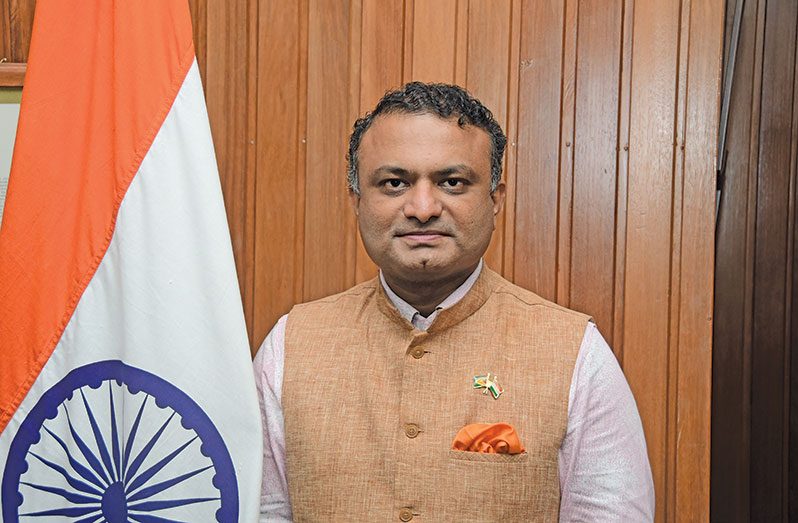— High Commissioner, Dr. K.J. Srinivasa
INDO-GUYANESE still retain their culture despite settling down in a far-off country for almost two centuries and the most beautiful aspect of their culture in Guyana is their strength of resilience and adaptation.
That was according to High Commissioner of India to Guyana, Dr. K.J. Srinivasa, who was at the time speaking at a virtual symposium marking 184 years of East Indian Arrival in Guyana, hosted by the University of Guyana, via a webinar on Wednesday.
Under the theme “Contributions of our unsung heroes to Guyana”, the High Commissioner said it was not an exaggeration to say that Indian culture has tremendous influence on the overall culture of Guyana, be it music, food, language, art and costumes, amongst others.
“As we are all aware, Indian religious rituals, cuisine, customs and traditions have indeed enriched the country’s cultural mosaic. Indian enterprise diversified the local economy. Indian descendants ventured successfully into politics and were active in social organisations and in sport. Indians have achieved prominence in all aspects of national life. They cultivated respectful relations with other races and, in so doing, fostered the development of a more cohesive nation. They are an integral part of the political system and, together with other ethnic groups, contributed to the evolution of Guyana’s demography, economy and society,” Dr. Srinivasa explained.
The High Commissioner noted that the Indian diaspora in Guyana has played and is playing a crucial role in the economic, political and social development of the country.
The indentured Indians after the completion of their contracts took to their occupations and displayed the diversity of their natural and acquired talents.
“Gradually, Indians began to move into market gardening, milk production, rice and other agricultural production, thus ensuring the food security of the country. Some moved into commerce selling mainly groceries and haberdashery and later consumer durables like cars and agricultural machines and since they had to be very competitive to survive, the consumers benefitted, the occupations of ‘free’ Indians displayed the diversity of their natural and acquired talents,” he underscored.
EXCELLED
They excelled in all areas of development and careers most notably in business, politics and the legal and medical field, he said.
One other aspect of Indian origin, he added, was the introduction of two religions: Hinduism and Islam which were strengthened and their places of worship were renewed and Indian culture began to contribute to mainstream national culture.
“All cultures are unique, rich and meaningful in their own ways. The same can be said for the Indo-Guyanese culture of Guyana. In many ways, the overall cultural stage of Guyana was significantly shaped by Indians. Their culture has many branches and roots; it is more than what the eye meets. Perhaps, the most beautiful aspect of the Indo-Guyanese culture in Guyana is the strength of its resilience and adaptation,” Dr. K.J. Srinivasa said.
The Indian culture in Guyana, he explained differs from that of its ancestors’ in India. From the language they speak, all the way to how they cook the curried dishes, all of which are different but still yet significant.
“That is evidence that culture can adapt and still be preserved at the same time. Their ancestors had to adapt to this tropical region, they had not the tools and ingredients to cook their traditional foods, they had not the garments to make their traditional wear and they also lost their mother tongue along the way and adapted to western languages,” he said.
Dr. K.J. Srinivasa continued: “Nonetheless, what we know today as the ‘Indo-Guyanese Culture’ is undoubtedly significant and relevant to who and what are known as Guyanese. There was a struggle to maintain the Indian culture because of the personal struggles those before now faced on the plantation. However, they have preserved Indian culture creditably and successful because across Guyana, religion and culture has been spread and practised.”
However, he noted that the language is something that has suffered tremendously. Unlike Guyana’s neighbours Suriname and Trinidad and Tobago where Hindi or in fact, Bhojpuri is spoken, Hindi is not spoken as a main language in Guyana.
VERY PROUD
India, he said is very proud of the achievements by the Indo-Guyanese diaspora and their role in the development of Guyana.
“I consider it indeed a matter of great honour and privilege for me to have been appointed to serve as the Indian High Commissioner to this Girmitiya land. The priority of the current Government of India led by Honourable Prime Minister of India, Shri Narendra Modi, is to build everlasting links with the Indian Diaspora the world over, especially with our Indian Diaspora in the Girmitiya lands including Guyana, Suriname, Trinidad and Tobago, Mauritius, Fiji and South Africa. In fact, Indian Prime Minister Modi ji had been to Guyana around 1999-2000 and he fondly remembers the people and country of Guyana,” Dr. Srinivasa expressed.
He said he sincerely hopes that Indian Arrival Day is used suitably to reflect and show appreciation to the contributions that the Indian ancestors in Guyana have made and find ways and means to preserve the existing and metamorphosised version of the Indian culture.
“A nation’s culture resides in the hearts and in the souls of its people,” said the High Commissioner in quoting Mahatma Gandhi. He added: “Let then in Guyana, the Indian culture be reflective through the goodness and light of our hearts and souls.”


.jpg)











